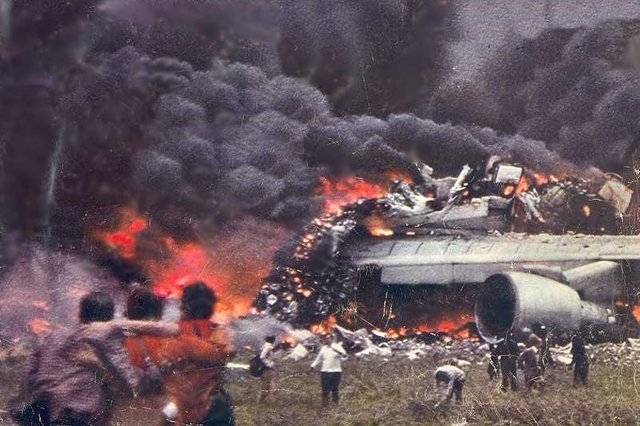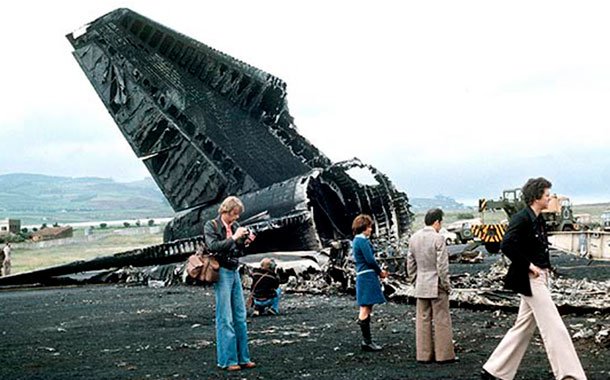La peor tragedia aérea de la historia de la aviación civil. Areopuerto de Los Rodeos (Tenerife Norte) / The worst air tragedy in the history of civil aviation. Los Rodeos Areopuerto (North Tenerife)
Hace 41 años, un domingo 27 de marzo de 1977, se produjo la colisión de dos Boeing 747 de las areolíneas KLM y Pan Am, considerado hasta la fecha como" la tragedia arérea más grande de la historia"; los hechos ocurrieron en la pista del aeropuerto de Los Rodeos, actualmente llamado Tenefire Norte de las Islas españolas de Tenerife, dejando un saldo de 583 personas fallecidas.
41 years ago, on Sunday March 27, 1977, there was a collision of two Boeing 747 of the KLM and Pan Am areolines, considered to date as "the largest aerial tragedy in history"; the events occurred on the runway of Los Rodeos airport, currently called Tenefire Norte of the Spanish islands of Tenerife, leaving a balance of 583 people dead.

Fuente

En el vuelo 1736 de Pan Am, viajaban 380 pasajeros y en el 4805 de KLM 234 pasajeros. Ambas aereonaves tenían planificado aterrizar en el areopuerto de Gran Canarias, pero debido a la explosión de una bomba y la amenaza de un segundo artefacto explosivo, ambos vuelos fueron desviados al Aerepuerto de Los Rodeos.
Bajo la premisa de que este areopuerto tenía varias limitaciones como una sola pistas de aterrizaje y no contaban con un radar, ni luces en la pista y además de que como era domingo, solo contaban con dos turnos.
Los dos vuelos surtieron combustible y después de más de dos horas de espera para poder despegar, recibieron una serie de instrucciones y maniobras particulares para cada areonave, debido a la intensa niebla el vuelo de Pan Am se pasó la tercera salida y siguió hacia la cuarta salida, fue entonces cuando el copiloto le advierte al piloto que aún no tenían permiso para despegar y le hablan a la torre de control, ésta le da instrucciones de la ruta a seguir, más no autorizan el despegue.
Tras una serie de indicaciones dadas en inglés y cuya interpretación pudieron ser confusa, la torre de control le dijo al vuelo de Pan Am : «Papa Alfa uno siete tres seis reporte pista libre», esta comunicación también fue escuchada por el vuelo de KLM e inmediatamente Pan Am respondió: «Okay, reportaremos cuando la dejemos libre».
No obstante, el piloto de KLM que escucho todo al igual que el ingeniero de vuelo tuvieron dudas de que la pista estaba despejada, pero no objetaron debido a que sabían que el piloto de la otra areonave tenía una trayectoría reconocida y aceptaron como un hecho que la pista estaba libre y podían despegar.
Fué entonces cuando ambas areonaves iniciaron el despegue y hubo la colisión.
Bajo la premisa de que este areopuerto tenía varias limitaciones como una sola pistas de aterrizaje y no contaban con un radar, ni luces en la pista y además de que como era domingo, solo contaban con dos turnos.
Los dos vuelos surtieron combustible y después de más de dos horas de espera para poder despegar, recibieron una serie de instrucciones y maniobras particulares para cada areonave, debido a la intensa niebla el vuelo de Pan Am se pasó la tercera salida y siguió hacia la cuarta salida, fue entonces cuando el copiloto le advierte al piloto que aún no tenían permiso para despegar y le hablan a la torre de control, ésta le da instrucciones de la ruta a seguir, más no autorizan el despegue.
Tras una serie de indicaciones dadas en inglés y cuya interpretación pudieron ser confusa, la torre de control le dijo al vuelo de Pan Am : «Papa Alfa uno siete tres seis reporte pista libre», esta comunicación también fue escuchada por el vuelo de KLM e inmediatamente Pan Am respondió: «Okay, reportaremos cuando la dejemos libre».
No obstante, el piloto de KLM que escucho todo al igual que el ingeniero de vuelo tuvieron dudas de que la pista estaba despejada, pero no objetaron debido a que sabían que el piloto de la otra areonave tenía una trayectoría reconocida y aceptaron como un hecho que la pista estaba libre y podían despegar.
Fué entonces cuando ambas areonaves iniciaron el despegue y hubo la colisión.
On flight 1736 of Pan Am, 380 passengers were traveling and on flight 4805 of KLM 234 passengers. Both airplanes had planned to land in the airport of Gran Canarias, but due to the explosion of a bomb and the threat of a second explosive device, both flights were diverted to the Aerepuerto de Los Rodeos.
Under the premise that this airport had several limitations as a single landing strips and did not have a radar, or lights on the track and besides that since it was Sunday, they only had two shifts.
The two flights provided fuel and after more than two hours of waiting to take off, they received a series of instructions and specific maneuvers for each areonave, due to the intense fog the Pan Am flight passed the third exit and continued towards the fourth exit, it was then when the co-pilot warns the pilot that they still did not have permission to take off and they speak to the control tower, they give instructions of the route to follow but do not authorize the takeoff.
After a series of indications given in English and whose interpretation could be confusing, the control tower told the Pan Am flight: "Papa Alfa one seven three six report free track", this communication was also heard by the flight of KLM and immediately Pan Am replied: "Okay, we'll report when we let it go."
However, the KLM pilot who heard everything as well as the flight engineer had doubts that the runway was clear, but did not object because they knew that the pilot of the other areonave had a recognized trajectory and accepted as a fact that the runway was free and they could take off, that's when both areonaves started the takeoff and there was the collision
Under the premise that this airport had several limitations as a single landing strips and did not have a radar, or lights on the track and besides that since it was Sunday, they only had two shifts.
The two flights provided fuel and after more than two hours of waiting to take off, they received a series of instructions and specific maneuvers for each areonave, due to the intense fog the Pan Am flight passed the third exit and continued towards the fourth exit, it was then when the co-pilot warns the pilot that they still did not have permission to take off and they speak to the control tower, they give instructions of the route to follow but do not authorize the takeoff.
After a series of indications given in English and whose interpretation could be confusing, the control tower told the Pan Am flight: "Papa Alfa one seven three six report free track", this communication was also heard by the flight of KLM and immediately Pan Am replied: "Okay, we'll report when we let it go."
However, the KLM pilot who heard everything as well as the flight engineer had doubts that the runway was clear, but did not object because they knew that the pilot of the other areonave had a recognized trajectory and accepted as a fact that the runway was free and they could take off, that's when both areonaves started the takeoff and there was the collision


Fuente

Para el momento de la colisión el vuelo de Pan Am estaban aún en tierra, pero el vuelo de KLM ya estaba en el aire, la tragedia no hubiese ocurrido según los expertos, si el vuelo de KLM hubiese estado 25 pies más elevado de la pista.
El vuelo de KLM impactó con el techo de la cabina del Pan Am y le quitó la cubierta de los pasajero, muriendo la mayoría que se encontraban en la parte trasera de la areonave, un total de 335 pasajeros. Por su parte el vuelo de KLM siguió volando y cayó a 100 metros de distancia, impactando contra el piso y siguió 300 metros más incendiandose inmeditamente, muriendo todos los pasajeros.
El vuelo de KLM impactó con el techo de la cabina del Pan Am y le quitó la cubierta de los pasajero, muriendo la mayoría que se encontraban en la parte trasera de la areonave, un total de 335 pasajeros. Por su parte el vuelo de KLM siguió volando y cayó a 100 metros de distancia, impactando contra el piso y siguió 300 metros más incendiandose inmeditamente, muriendo todos los pasajeros.
By the time of the collision the Pan Am flight was still on the ground, but the KLM flight was already in the air, the tragedy would not have occurred according to the experts, if the KLM flight had been 25 feet higher than the ground, so the collision would not have happened.
On the KLM flight it hit the roof of the Pan Am cabin and took off the passenger deck and most of the people who were at the rear of the arena died, killing 335 passengers. For its part, the flight of KLM continued flying and fell to 100 meters hitting the floor and continued 300 meters more burning immediately, killing all passengers.
On the KLM flight it hit the roof of the Pan Am cabin and took off the passenger deck and most of the people who were at the rear of the arena died, killing 335 passengers. For its part, the flight of KLM continued flying and fell to 100 meters hitting the floor and continued 300 meters more burning immediately, killing all passengers.


Las investigaciones de los expertos en areonáutica civil, presentando una serie de posible causas y la que más llama la atención es la llamada «síndrome de la prisa», esto motivado a la presión de los pilotos de las areonaves, con el cumplimiento de lo establecido en los itinerareos de vuelo, ya que este incumpliento acarrearía sanciones estipuladas en las regulaciones aereas establecidas en cada país y gastos administrativos adicionales por hospedajes y traslados a los pasajeros en caso de tener un retraso mayor a tres horas para llegar a su destino final, esto en el caso de las areolineas que estuvieron involucradas en la tragedia.
The investigations of the experts in civil areonautics, presenting a series of possible causes and the most striking is the so-called "hurry syndrome", this motivated by the pressure of the pilots of the areonaves, with compliance with the established in flight itineraries, since this non-compliance would entail sanctions stipulated in the air regulations established in each country and additional administrative expenses for boarding and transfers to passengers in case of having a delay greater than three hours to reach its final destination, this in the case of the areolines that were involved in the tragedy.

 )
)
Gracias cervantes por el apoyo
Congratulations @felixmillan! You have completed the following achievement on the Steem blockchain and have been rewarded with new badge(s) :
Click here to view your Board of Honor
If you no longer want to receive notifications, reply to this comment with the word
STOP